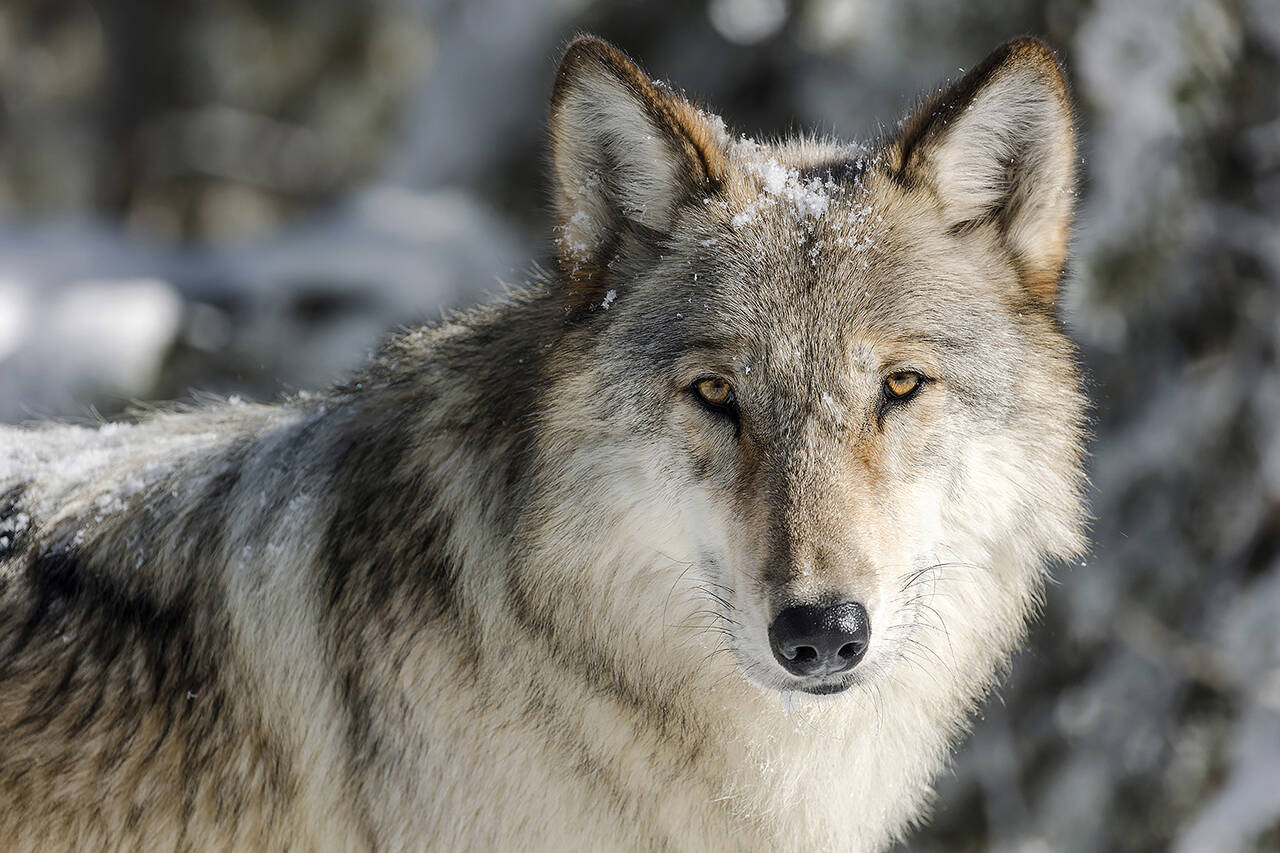By Matthew Brown and John Flesher / Associated Press
BILLINGS, Mont. — A judge restored federal protections for gray wolves across much of the U.S. on Thursday, after their removal in the waning days of the Trump administration exposed the predators to hunting that critics said would undermine their rebound from widespread extermination early last century.
U.S. District Judge Jeffrey White in Oakland, California, said the U.S. Fish and Wildlife Service had failed to show wolf populations could be sustained in the Midwest and portions of the West without protection under the Endangered Species Act.
Wildlife advocates had sued the agency last year. The ruling does not directly impact wolves in the northern Rocky Mountains of Idaho, Montana and Wyoming and portions of several adjacent states. Those animals remain under state jurisdiction after federal protections in that region were lifted by Congress last decade.
Attorneys for the Biden administration defended the Trump rule that removed protections, arguing wolves were resilient enough to bounce back even if their numbers dropped sharply due to intensive hunting.
At stake is the future of a species whose recovery from near-extinction has been heralded as a historic conservation success. That recovery has brought bitter blowback from hunters and farmers angered over wolf attacks on big game herds and livestock. They contend protections are no longer warranted.
Interior Department spokesperson Melissa Schwartz said the agency was reviewing Thursday’s decision and offered no further comment.
Wildlife advocacy groups said the judge’s order would most immediately put a stop to hunting in the Great Lakes region, where Wisconsin officials had come under criticism after a wolf hunt last year blew past the state’s quotas, killing 218 wolves in four days.
“Wolves in the Great Lakes region have a stay of execution,” said John Horning with the environmental group WildEarth Guardians.
Wolf attacks on livestock are uncommon but can cause significant economic damage to farmers when their cows or sheep are killed.
And wolves in some places have reduced the size of elk and deer herds, their natural prey. That has stirred anger among hunters who target the big game animals.
The American Farm Bureau Federation, National Rifle Association and other industry groups had urged Judge White not to restore federal protection, keeping the wolves under the control of state officials who allow wolf hunting.
None of the Great Lakes states with established wolf populations — Michigan, Minnesota and Wisconsin — had scheduled additional wolf hunts prior to the judge’s ruling. All three were updating their wolf management programs and officials said that work would continue.
A state judge in Wisconsin in October had blocked a hunt two weeks before it was to begin, responding to a lawsuit that claimed it was illegally scheduled.
In Michigan, where the wolf population numbers about 700, Republican legislators introduced pro-hunting resolutions but no formal proposal was before the wildlife commission that sets hunting seasons.
Before hunting is considered, Michigan officials want their legal status more permanently settled “given the long history of legal challenges to delisting decisions and the resulting shifting status of wolves,” said Ed Golder with the state Department of Natural Resources.
The status of northern Rockies wolves was not challenged in the lawsuit decided Thursday. However, the U.S. Fish and Wildlife Service in September began a separate review of whether protections should be restored for the region’s wolves, after Republican state lawmakers in Montana and Idaho passed laws last year intended to drive down wolf numbers by making it easier to kill them.
Under the loosened rules, hunters and trappers primarily in Montana have killed a record 23 wolves that wandered outside Yellowstone National Park this winter. That’s sparked public outrage due to the popularity of Yellowstone’s wolf packs among tourists who visit from around the world.
Following the killings, Interior Sec. Deb Haaland published an op-ed this week saying federal officials could give northern Rockies wolves emergency protection if the species is put at significant risk.
“Recent laws passed in some Western states undermine state wildlife managers by promoting precipitous reductions in wolf populations, such as removing bag limits, baiting, snaring, night hunting and pursuit by dogs — the same kind of practices that nearly wiped out wolves during the last century,” Haaland wrote.
Wolves once ranged most of the U.S. but were wiped out in most places by the 1930s under government-sponsored poisoning and trapping campaigns.
A remnant population in the western Great Lakes region has since expanded to some 4,400 wolves in Michigan, Minnesota and Wisconsin. And more than 2,000 wolves occupy six states in the Northern Rockies and Pacific Northwest.
Yet wolves remain absent across most of their historical range. Wildlife advocates argue that continued protections are needed so they can continue to expand in California, Colorado, Oregon and other states.
Democratic and Republican administrations alike, going back to former President George W. Bush, have sought to remove or scale back federal wolf protections first enacted in 1974.
Talk to us
> Give us your news tips.
> Send us a letter to the editor.
> More Herald contact information.

























